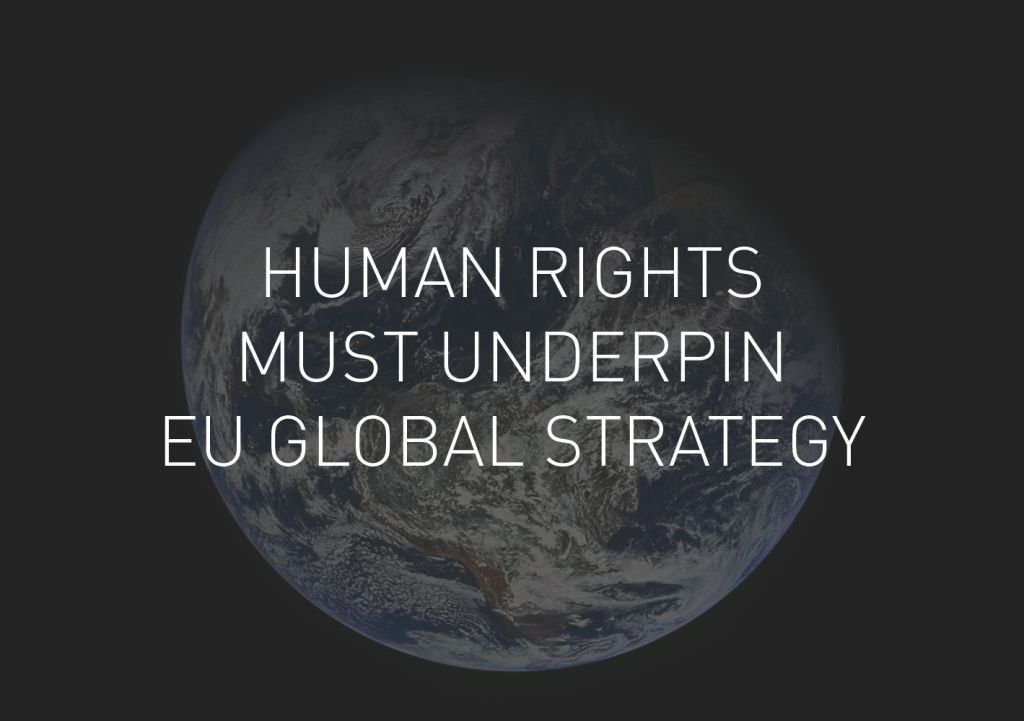Almost a year ago, Federica Mogherini, EU High Representative for Foreign Affairs and Security Policy, launched a reflection process on a new EU Global Strategy on Foreign and Security Policy. This strategy aims to “identify a clear set of objectives and priorities… [to] help promote the European Union’s interests globally, and ensure our security at home and abroad.” HRHN is worried that this process, and the proposed strategy itself, have not placed sufficient emphasis on human rights.
Both the European Parliament and civil society groups have in recent weeks sought additions to the strategy, underlining that it lacks a universal, systematic approach to promoting human rights. HRHN calls on the EU to heed these calls and to adopt a foreign policy and security strategy underpinned by human rights.
EU Parliament: “Integrate human rights into the Strategy”
On 13 April 2016, the EU Parliament passed a resolution on the EU Global Strategy.
The resolution states: “The EU, as a global actor, has a key role in upholding the principles… of universality and indivisibility of human rights,” and asserts that “Human rights must be meaningfully integrated into the new Global Strategy.”
The resolution further calls on “The EU and its Member States to ensure that EU foreign policy adopts a strategic approach to human rights… across different countries and regions, regardless of security, foreign policy, trade, energy, aid, or other concerns.”
NGOs: EU must protect human rights of all people
On 7 April 2016, 50 international NGOs issued a joint statement calling for human rights to underpin the new EU Global Strategy. These NGOs issued this statement through the Human Rights and Democracy Network (HRDN), an informal grouping of NGOs operating at EU level in the broader areas of human rights, democracy, and conflict prevention. HRHN is part of this informal grouping.
HRHN calls on the EU to adopt the recommendations made in the statement. Specifically, taking leadership on human rights and justice, defending the universality of human rights, and formulating an EU vision to challenge the rapidly closing space for civil society.
The HRDN statement outlines the need for EU action: “We are witnessing increasing violations of international human rights and humanitarian law and impunity for grave abuses worldwide… This context calls for a robust, meaningful response from the EU in protecting the human rights of all people, including demonstrating the political will to challenge vested interests which undermine human rights and democracy.”
EU lacks a consistent approach to human rights
HRHN is concerned at the EU’s inconsistent approach to raising human rights in the past 12 months, during the timeline of the reflection process on the Global Strategy.
In February 2016, the EU published its strategy for engagement at the UN. HRHN asserted that this was in fact a strategy of the EU remaining silent on human rights abuses in the European neighbourhood.
In November 2015, the EU published a review of its European Neighbourhood Policy (ENP). HRHN is concerned that this policy undermines a universal approach to human rights, opening the door for States to pick and choose whether they wish to have human rights on the agenda of their discussions with the EU.
The ENP states: “Differentiation and greater mutual ownership will be the hallmark of the new ENP, recognising that not all partners aspire to EU rules and standards, and reflecting the wishes of each country concerning the nature and focus of its partnership with the EU.”
“The EU has missed opportunities to place human rights at the forefront of its foreign policy, particularly in the European neighbourhood,” Irminger concludes: “The EU must take international leadership on human rights, and codify human rights into the global EU agenda.”
EU Global Strategy on Foreign and Security Policy
In June 2015 the EU’s High Representative for Foreign Affairs and Security Policy, Federica Mogherini, presented her strategic assessment of the global context to EU leaders. They asked her to prepare an EU Global Strategy on Foreign and Security Policy to guide the European Union’s global actions in the future.
The EU’s outreach and consultation process on the strategy will end with a concluding conference in Paris on 22 April 2016.
The previous EU strategy focusing on security was adopted in December 2003.





